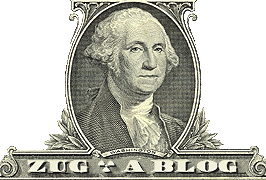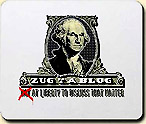Our Man In Bratislava
Ladies, and Gentlemen, I give you guest blogger, our Ambassador to Slovakia (Extraordinary and Plenipotentiary), Rudolph "Skip" Vallee, a quik-e-mart mogul from Vermont. Rudy Vallee. No. Sorry, SKIP Vallee. Here's from the official biography:
Rodolphe "Skip" Vallee - Biography
Rodolphe "Skip" Vallee arrived in Bratislava August 11, 2005 to take up his duties as Ambassador Extraordinary and Plenipotentiary of the United States of America to the Slovak Republic.
Previously, Ambassador Vallee served as Chairman, CEO, and owner of R. L. Vallee, Inc., a Vermont-based energy company that includes the "Maplefields" convenience store chain, a top regional motor fuels distributorship, and an environmental remediation and consulting unit ...
And here's his Speech:
Theodore Roosevelt, Ronald Reagan and George W. Bush: Leadership and Moral Clarity
Remarks to the Ronald Reagan Conservative Club, University Library, Bratislava, Slovakia
November 21, 2005
There is no better way to talk about Ronald Reagan than to quote from the man himself, when he spoke of communist regimes in 1983. "Let us beware that while they preach the supremacy of the state, declare its omnipotence over individual men, and predict its eventual domination of all the peoples of the earth, they are the locus of evil in the modern world."
Locus of evil. These words shocked a diplomatic world where morality in policy was viewed as something to be checked at the luggage counter. But it is the element of morality, of good versus evil, of white and black, of right and wrong that propelled the diplomacy of Presidents Theodore Roosevelt and Ronald Reagan. And President Bush has referred to certain countries as the axis of evil.
And while my comments today are about Teddy Roosevelt, Reagan, and George W. Bush, let us not forget the strong moral commitment of Franklin Roosevelt, Harry Truman's plainspoken midwestern courage, and John F. Kennedy's instinctive anticommunism.
It is no accident that Teddy Roosevelt's desk, molded from the ancient timbers of His Majesty's Ship the Resolute-oak colored with age and Arctic weather-became the desk of Reagan and George W. Bush. Reagan made his three inches higher than Teddy had-having more to do with style, argues Edmund Morris, than height. Roosevelt would hunch over and devour documents-he wrote hundreds of articles and books; Reagan was more aloof in a straight up, quiet and dignified way. I haven't had a chance to examine the height of President Bush's desk, but I know that on a nearby wall is a painting showing a horseman charging up a steep cliff, with other horsemen following.
It's a western scene by W. H. S. Koerner entitled "A Charge to Keep." It is modeled after the Wesley hymn, "A Charge to Keep I Have." The hymn ends with a call to engage all of one's powers to fulfill one's call to service.
And to serve a cause greater than oneself often means taking the lonely trail of leadership. It discounts CNN's overnight pollsters. It ignores, in Reagan's case, the "Blame American First Crowd." In Teddy Roosevelt's time it meant fighting back against the "Peace at any Price" advocates. Leadership means being on a horse, headed up a steep mountain, dragging riders up from behind.
I have a theory that the moral quality in the rhetoric of Roosevelt, Reagan, and Bush is in part a reflection of how they were influenced by our American west. While born a New Yorker, Roosevelt was never happier than when on a horse high in the Rockies with the wind in his face. When his mother and wife died suddenly, on the same day, Roosevelt packed himself west to his Medora ranch in the Dakotas where for several years he toiled ceaselessly in the saddle 16 hours a day.
Roosevelt loved the west because of its "rugged and stalwart democracy" where "every man stands for what he actually is and can show himself to be." In the west, notes Roosevelt, "a man who in civilization would be merely a backbiter becomes a murderer on the frontier, but, on the other hand, he who in the city would do nothing more than give a cheery good morning, shares his last bit of sun-jerked venison with you when threatened with starvation in the wilderness."
Ronald Reagan is most famous for his vision of a "shining city on the hill," but it was Reagan's beloved ranch, Rancho del Cielo, ranch of the sky, which, astride a mountaintop, sustained and nourished Reagan's soul. "There is nothing better for the inside of a man than the outside of a horse," Reagan would often say in a cornball way. And like President Bush, Reagan graced his inner sanctum with a cowboy picture, entitled "the Lame Horse." Led by the reins, once again, by a brave rain beaten cowboy, the horse has fallen under the care and protection of a strong leader. Ronald Reagan's daughter Patti often noted that on the ranch her father experienced God and nature almost as the same thing.
George W. Bush, too, has a ranch, nestled in the heat of West Texas. Some would say that Texas itself is but one free and open ranch-in style, attitude, and outlook. The President, Midland born, fancies himself as the Texan he is, and not the scion of the establishment East. He too derives spiritual nourishment from the simplicity of the downtown diner, the centrality of the local high school, and the joy of brush well cleared. For President Bush everyday on his land is Earth day.
For each of these Presidents, rounded in the rugged robustness of the American west, principles of freedom and moral clarity mold their cores. "What I admire about you most, Theodore," noted Roosevelt's friend Elihu Root to the not overtly religious Roosevelt, " is your discovery of the ten commandments." Throughout his career, Roosevelt battled-in graphic language of right and wrong-graft, nepotism, machine politics, bad business combinations, malefactors of great wealth, and imperialistic foreign interveners. He believed that the relations between nations were guided by the same moral code that governed the men of the badlands who were his cowboy neighbors. A man's word-a country's word-were sacred bonds.
Roosevelt believed in diplomacy guided by a code of honor that strove to "raise the ethical standard of national action," and one that sought "reasonable ideals." "Keep your eyes on the stars," notes a tablet by Roosevelt's grave, "and your feet on the ground."
Ronald Reagan needed no push to look at his stars, brought closer by some 2250 feet, from the porch of his ranch above the fogbanks of Santa Barbara bay. Reagan's reflexive defense of liberty was fueled by the freedom he felt in his mountain air and unimpeded trails. His early days in the Screen Actor's Guild nurtured this distaste for communism, and we see this in his speeches well before he became President.
But the starkness of his prose once he became President, the clear divide he cleaved between good and evil, stunned the armchair, "let's just get along" establishment. His speech at Westminster Palace in 1982 moved American rhetoric and policy away from hiding reality behind the niceties of diplomacy. The Berlin wall became "a grim symbol of power untamed." "Regimes planted by bayonet," noted Reagan, "do not take root." Reagan reminded us that self-delusion in the face of unpleasant facts is folly. "Marxism", he said, "should be left in the ash bin of history."
In Orlando, Florida, a short time later, Reagan gave his famous "evil empire" speech. Lenin, we were reminded, repudiates morality. Reagan, quoting Lewis, noted that the daily evil of Soviet (and before that Nazi) labor and concentration camps was directed in "clear, carpeted, warmed, and well-lit offices by quiet men in white colors with cut fingernails and smooth cheeks," Banal, sanitary, and evil.
We must not, concluded Reagan, "ignore the facts of history and the aggressive impulses of an evil empire, to simply call the arms race a great misunderstanding and thereby remove ourselves from the struggle between right and wrong and good and evil." And all around the globe, the press and editorialists and armchair strategists responded vigorously, massively and angrily. Reagan was a warmonger. Reagan was playing to his base. This was red meat for the faithful. Reagan is a dunce. He's a B-movie actor.
A B-movie actor maybe, but an actor with a voice whose clarity, honesty, and resoluteness shines brightly in free capitals across central Europe today. And in some ways I feel like I'm seeing the Reagan movie again. The sneering cynicism of the salons sometimes looks down on freedom and forgets to heed Teddy Roosevelt's admonitions. Strength must join moral purpose to respond to evil's most recent manifestation. As President Bush reminds us almost daily, preserving freedom is hard work. And it is lonely work. It follows clear-eyed recognition that freedom is not free and that evil cannot be willed away. It requires moral and political courage.
And so, like Roosevelt, and like Reagan, President Bush continues up the mountain with his charge to keep, knowing that the other side of the mountain brings a brighter day. And over this journey rain clouds gather periodically. But during these mountain deluges it is instructive to listen once again to the Gipper from his Winchester speech. "Sir Winston Churchill led his people to great victory in War and then lost an election just as the fruits of victory were about the be enjoyed. But he left office honorably, knowing that the liberty of his people was more important than any leader."
Your tax dollars at work.
Courage.










0 Comments:
Post a Comment
Links to this post:
Create a Link
<< Home